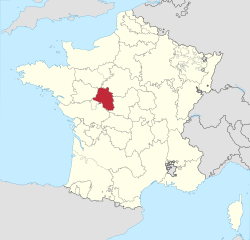Touraine
This article needs additional citations for verification. (July 2014) |
Touraine | |
|---|---|
 | |
| Country | France |
| Seat | Tours |
| Time zone | CET |
Touraine (US: /tuˈreɪn, tuˈrɛn/;[1][2][3] French: [tuʁɛn] ) is one of the traditional provinces of France. Its capital was Tours. During the political reorganization of French territory in 1790, Touraine was divided between the departments of Indre-et-Loire, Loir-et-Cher, Indre and Vienne.
Geography
[edit]Traversed by the river Loire and its tributaries the Cher, the Indre and the Vienne, Touraine makes up a part of the western Paris Basin. It is well known for its viticulture. The TGV high-speed train system, which connects Tours with Paris (200 kilometers away) in just over an hour, has made Touraine a place of residence for people who work in the French capital but seek a different quality of life.
History
[edit]Touraine takes its name from a Celtic tribe called the Turones, who inhabited the region about two thousand years ago. In 1044, the control of Touraine was given to the Angevins, who (as the House of Plantagenet) became kings of England in 1154, the castle of Chinon being their greatest stronghold. In 1205, Philip II Augustus of France regained Touraine. At this time, Touraine was made into a royal duchy. In 1429, Saint Joan of Arc had a historic meeting with the future King of France Charles VII at Chinon. Throughout the late 15th and 16th centuries, Touraine was a favorite residence of French kings, and the dark and gloomy castles were converted to Renaissance châteaux; for this reason the region was titled "The Garden of France". These same châteaux became popular tourist attractions in modern times. The royal duchy became a province in 1584, and was divided into departments in 1790.
Notable people
[edit]- Peter des Roches (died 1238), Bishop of Winchester.[4]
- François Rabelais (ca.1483-1553), a Renaissance writer and humanist, physician, monk and Greek scholar.[5]
- René Descartes (1596–1650), a French philosopher, scientist and mathematician.[6]
- Jean Thurel (1698–1807), a fusilier of the French Army and centenarian
- Alfred de Vigny (1797–1863), a French poet and early French Romanticist.[7]
- Honoré de Balzac (1799–1850), a French novelist and playwright.[8]
- René Boylesve (1867–1926), a French writer and literary critic.
See also
[edit]References
[edit]- ^ "Touraine". The American Heritage Dictionary of the English Language (5th ed.). HarperCollins. Retrieved 11 August 2019.
- ^ "Touraine". Collins English Dictionary. HarperCollins. Retrieved 11 August 2019.
- ^ "Touraine". Merriam-Webster.com Dictionary. Merriam-Webster. Retrieved 11 August 2019.
- ^ Davis, Henry William Carless (1911). . Encyclopædia Britannica. Vol. 21 (11th ed.). pp. 292–293.
- ^ Saintsbury, George (1911). . Encyclopædia Britannica. Vol. 22 (11th ed.). pp. 769–773.
- ^ Wallace, William (1911). . Encyclopædia Britannica. Vol. 8 (11th ed.). pp. 79–90.
- ^ Saintsbury, George (1911). . Encyclopædia Britannica. Vol. 28 (11th ed.). pp. 61–62.
- ^ Saintsbury, George (1911). . In Chisholm, Hugh (ed.). Encyclopædia Britannica. Vol. 3 (11th ed.). Cambridge University Press. pp. 298–301.
 Media related to Touraine at Wikimedia Commons
Media related to Touraine at Wikimedia Commons
47°24′N 0°41′E / 47.400°N 0.683°E
- Touraine
- Former provinces of France
- Geography of Indre
- Geography of Indre-et-Loire
- Geography of Loir-et-Cher
- Geography of Vienne (department)
- Dukes of Touraine
- History of Centre-Val de Loire
- History of Nouvelle-Aquitaine
- History of Indre
- History of Indre-et-Loire
- History of Loir-et-Cher
- History of Vienne (department)
- Centre-Val de Loire geography stubs



